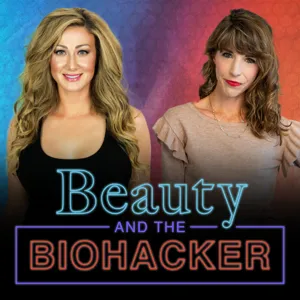Podcast Summary
Cranberries and UTIs: Prevention and Controversies: Cranberries may help prevent UTIs due to unique chemicals, while other berries and supplements could also offer benefits. Whole food supplements and gut microbes play a role in their effectiveness.
Key takeaway from this episode of Doctor's Kitchen podcast is that cranberries, with their unique chemical properties, may help prevent urinary tract infections (UTIs). Dr. Rupi, the host, delves into the mechanisms of action of these chemicals and discusses the controversies surrounding recent research findings. Cranberries are not the only natural product that could potentially prevent UTIs, as other berries and supplements may also offer benefits. The episode also touches upon the importance of whole food supplements and the impact of gut microbes on the effectiveness of these foods. Additionally, listeners are encouraged to check out the Doctor's Kitchen app and YouTube channel for more content, including weekly deep dives into specific ingredients and recipes tailored to health needs.
Preventing UTIs: Natural Remedies and Evidence-Based Strategies: Stay hydrated, maintain bladder health, practice good hygiene, and consider cranberries as an additional tool for UTI prevention. More research is needed to confirm cranberries' efficacy.
Urinary tract inctions (UTIs) are common, particularly among women, and can lead to serious health consequences if left untreated or if recurrent. Preventing UTIs through evidence-based methods is crucial to avoid antibiotic resistance and potential complications. Cranberries are often suggested as a natural remedy due to historical use and potential benefits, but it's essential to evaluate their effectiveness. Key strategies for UTI prevention include staying hydrated by drinking plenty of water, maintaining bladder health, and practicing good hygiene. Cranberries may be an additional tool in the prevention toolkit, but more research is needed to confirm their efficacy. It's important to note that not all UTIs are the same, and some may require medical attention beyond natural remedies. Staying informed and working with healthcare professionals to develop a comprehensive prevention plan is key.
Maintaining urinary health: Stay hydrated, empty bladder frequently, and practice good hygiene: Stay hydrated, empty bladder frequently, practice good hygiene during sex and use of certain birth control products, and consider adding American cranberries to your diet to maintain urinary health and prevent UTIs
Maintaining good urinary health involves several key practices. Firstly, staying hydrated by drinking plenty of fluids helps prevent urinary tract infections (UTIs) and kidney stones. Secondly, emptying your bladder frequently is important as it reduces the risk of bacteria sticking to the bladder walls and causing infections. Urinating after sex and wiping front to back are also effective ways to prevent UTIs. Certain birth control products, such as diaphragms, may increase the risk of UTIs, so consider changing or being extra hygienic with them. Avoiding irritating feminine hygiene products is also crucial as they can disrupt the normal bacteria in the genital area, increasing the risk of UTIs. Probiotics and low sugar diets may offer potential benefits, but more research is needed. As of 2023, cranberries, especially American cranberries, have shown promise in preventing UTIs and may be added to this list of preventative measures.
Cranberries: A Natural Remedy for Urinary Tract Infections: Cranberries, rich in proanthocyanidins or PACs, prevent E. Coli and other bacteria from adhering to urinary tract walls, making them a popular natural remedy for UTIs.
Cranberries, specifically the American variety, have been studied for their potential benefits in preventing and treating urinary tract infections (UTIs), primarily due to their high content of a type of polyphenols called proanthocyanidins or PACs. These compounds are known for their ability to prevent certain bacteria, most notably E. Coli, from adhering to the bladder and urinary tract walls. Cranberries are also rich in other nutrients, vitamins, and phytochemicals that contribute to overall health. Traditionally used as medicines for various illnesses, cranberries have been studied for decades by researchers worldwide for their urinary benefits. While both American and European varieties have these beneficial compounds, more studies have focused on the American variety. Cranberries' potential mechanism of action involves preventing bacterial colonization and subsequent infections. UTIs are commonly caused by E. Coli, but other bacteria like klebsiella and enterococcus can also cause infections. Cranberries' high PAC content makes them a popular natural remedy for UTIs.
Cranberries' anti-adhesive effect against bacteria: Cranberries' complex phenolic compounds create multiple metabolites with additive and synergistic effects, and gut microbiota plays a role in metabolizing these compounds into bioactive forms for enhanced urinary tract health benefits.
Cranberries and their derived compounds, particularly the A-type proanthocyanidins (PACs), exhibit an anti-adhesive effect against bacteria like E. Coli in cell cultures. This is the main mechanism behind the preventative effects of cranberry consumption against urinary tract infections. However, it's unlikely that this effect is due to a single compound, as cranberries contain many phenolic compounds with complex metabolism. When consumed and digested, multiple metabolites are created, and research suggests that these metabolites may have additive and synergistic effects. Furthermore, the gut microbiota is involved in metabolizing these cranberry polyphenols into bioactive compounds that not only elicit an anti-adhesive effect but also have direct antimicrobial and anti-inflammatory effects. Therefore, consuming cranberries or cranberry supplements may provide a more significant impact on urinary tract health than taking a single compound in isolation.
Cranberries may help prevent UTIs through multiple mechanisms: Cranberries may reduce UTI occurrence by preventing bacteria adherence, impacting bacteria directly, and reducing inflammation, according to some research. A Cochrane review suggests potential benefits, but individual gut microbiota plays a role.
Cranberries may help prevent urinary tract infections (UTIs) through multiple mechanisms. First, they prevent bacteria from adhering to the urinary tract walls. Second, the gut microbiota breaks down cranberries into compounds that directly impact bacteria. Lastly, cranberries reduce inflammation, easing common UTI symptoms. These mechanisms are not fully understood but are supported by some research. A recent Cochrane review, which analyzes human health studies, found that cranberry products may reduce the occurrence of UTIs in over 8,000 people when compared to placebo, no treatment, or other treatments like antibiotics and probiotics. However, it's important to note that the benefits of cranberries may depend on an individual's unique gut microbiota composition. To maximize the potential benefits, focus on a diverse diet rich in whole foods, rather than processed foods with added sugars and fillers.
Cranberries reduce UTIs in certain populations: Cranberries may help prevent UTIs in women, children, and susceptible individuals, but more research is needed to determine their effectiveness compared to antibiotics or probiotics. Industry influences can impact trial results.
Cranberries have been found to reduce the number of urinary tract infections (UTIs) in women with recurrent UTIs, children, and people susceptible to UTIs. However, the effect is not the same for elderly people living in institutions, pregnant women, or those with bladder emptying problems. More research is needed to determine whether cranberry products are more or less effective compared to antibiotics or probiotics. The latest Cochrane review provides more clarity to the long-standing debate about the effectiveness of cranberries for preventing UTIs, as previous results were mixed. The change in the last 10 years can be attributed to more recent trials, improved research consistency, and potentially more effective doses. It's important to be aware of industry influences on trials, as they can impact the results. Cranberries are now mentioned in official guidelines as a suggestion for UTI prevention, despite the weak evidence. The European Association of Urology recommends regular cranberry consumption due to its favorable benefit-to-harm ratio.
Cranberry supplementation for urinary tract health: Dosage and form matter: The effectiveness of cranberry for preventing and treating urinary tract infections is not clear-cut, and dosage and form play a significant role. More research is needed to determine the most effective form, dose, and duration.
When it comes to using cranberry for health benefits, whole food-based supplements generally have more favorable benefit-to-harm ratios than extracts or highly concentrated forms. However, the evidence for the effectiveness of cranberry in preventing urinary tract infections is not clear-cut, and there is significant heterogeneity in the research regarding appropriate form, dose, and duration. Studies have investigated a wide range of cranberry products, from juice to tablets, and the doses used have varied greatly, from as little as 0.2 mils per kilogram to over 5 mils per kilogram. This significant variability in dosages makes it difficult to draw definitive conclusions about the efficacy of cranberry for preventing urinary tract infections. Furthermore, the evidence regarding the use of cranberry for treating urinary tract infections is even less clear. Ultimately, more research is needed to establish the most effective form, dose, and duration of cranberry supplementation for urinary tract health. Until then, it's important to approach cranberry supplementation with caution and to consult with a healthcare professional for personalized guidance.
Preventing UTIs with Cranberries: Juice or Capsules?: Cranberries can help prevent UTIs when used with other measures, but consider pros and cons of juice vs capsules and consult a healthcare professional.
Cranberries, whether in juice or capsule form, can be effective in preventing urinary tract infections (UTIs) when used in conjunction with other preventative measures. Cranberry juice offers the benefit of a whole cranberry product with concentrated polyphenols, but the lack of fiber and high sugar content can be a concern. Capsules, on the other hand, are easy to take but come with the costs and potential quality concerns. The evidence for cranberries as a treatment for UTIs is insufficient, and it's important to consult a healthcare professional if experiencing symptoms. When considering cranberry products, be cautious of processed juices and those with added sugars. Overall, cranberries can be a valuable tool in reducing the need for antibiotics, but it's essential to consider the pros and cons and consult a healthcare professional for personalized recommendations.
Prevent UTIs with cranberries or other berries and maintain good hygiene: Cranberries prevent UTIs by stopping bacteria from adhering, ensure product authenticity, consider probiotics, Vitamin C, D Mannose, potassium and salt supplements, consult healthcare practitioner, maintain good hygiene, limit antibiotic use.
For those looking to prevent urinary tract infections (UTIs), pure cranberry juice or whole cranberry products, specifically those that are independently tested and certified, are a low-risk option. Cranberries contain unique polyphenols that have been shown to prevent UTIs by preventing bacteria from adhering to the bladder and urinary tract walls. However, it's essential to ensure the authenticity and quality of the product, as some may contain added sugars or only the active polyphenols, which may not be as effective. Other berries like blueberries, haskap berries, and lingonberries also have potential benefits, but the evidence is not as substantial as that of cranberries. Probiotics, Vitamin C, D Mannose, potassium and salt supplements, and certain botanicals like cinnamon and diuretics have varying degrees of efficacy. As always, it's crucial to consult a healthcare practitioner before starting any new supplement regimen, especially when considering supplements that may interact with medications. Additionally, maintaining good hygiene practices and limiting antibiotic use are essential steps in preventing UTIs.
Cranberries: A Natural Solution for UTIs: Cranberries may prevent UTIs with anti-adhesive properties and inflammatory effects, plus potential benefits for gut health and inflammation. Whole cranberry products are practical and effective.
Cranberries, particularly in the form of whole cranberry products, could be beneficial for preventing urinary tract infections (UTIs) due to their anti-adhesive properties and potential inflammatory effects. The entourage effect of other polyphenols in cranberries may also contribute to these benefits. While more research is needed on the use of cranberries for other bladder-related issues, it may still be worth trying due to the low risk and potential benefits. Whole cranberry products are also more practical for daily use and may provide additional benefits for gut health and inflammation. Overall, cranberries could be a natural and effective solution for those experiencing UTIs or urinary symptoms.






